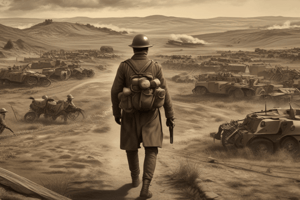Podcast
Questions and Answers
What was the main purpose of the arms race among the Great Powers of Europe?
What was the main purpose of the arms race among the Great Powers of Europe?
- To prepare for a possible war (correct)
- To make other countries feel scared
- To show off their military strength
- To reduce the chances of war
What was the main reason for the rivalry between Britain and Germany?
What was the main reason for the rivalry between Britain and Germany?
- Alliances
- Militarism
- Nationalism
- Imperialism (correct)
What was the short-term cause of the First World War?
What was the short-term cause of the First World War?
- Rise of nationalism in the Balkans
- Militarism in Europe
- Imperialism in Africa
- Assassination of Archduke Franz Ferdinand (correct)
Why did Germany invade France?
Why did Germany invade France?
What was the main effect of the alliances system in Europe?
What was the main effect of the alliances system in Europe?
Why did Russia support Serbia?
Why did Russia support Serbia?
What was the outcome of the assassination of Archduke Franz Ferdinand?
What was the outcome of the assassination of Archduke Franz Ferdinand?
Why did Britain declare war on Germany?
Why did Britain declare war on Germany?
What was the main goal of the Slavic nationalists in Bosnia and Serbia?
What was the main goal of the Slavic nationalists in Bosnia and Serbia?
What was the main consequence of the alliances system in Europe?
What was the main consequence of the alliances system in Europe?
What was the primary motivation for Germany's invasion of France?
What was the primary motivation for Germany's invasion of France?
What was the main driving force behind the imperialism of European powers?
What was the main driving force behind the imperialism of European powers?
What was the primary reason people joined the army during World War I?
What was the primary reason people joined the army during World War I?
What was the relationship between Austria-Hungary and Serbia during the events leading up to World War I?
What was the relationship between Austria-Hungary and Serbia during the events leading up to World War I?
What was the outcome of the assassination of Archduke Franz Ferdinand for Austria-Hungary?
What was the outcome of the assassination of Archduke Franz Ferdinand for Austria-Hungary?
What was the role of nationalism in the events leading up to World War I?
What was the role of nationalism in the events leading up to World War I?
What was the response of Britain to Germany's invasion of Belgium?
What was the response of Britain to Germany's invasion of Belgium?
What was the primary consequence of the arms race among the Great Powers of Europe?
What was the primary consequence of the arms race among the Great Powers of Europe?
Flashcards are hidden until you start studying
Study Notes
Main Long-term Causes of the First World War
- The Great Powers of Europe were building up their armed forces, leading to an arms race, which increased tension and fear among them.
- The formation of two alliance systems, the Triple Entente (Britain, France, and Russia) and the Triple Alliance (Germany, Austria-Hungary, and Italy), made a war involving all of the Great Powers more likely.
- Imperialism led to competition over the size of their empires, with Germany wanting to expand its empire, opposed by Britain, increasing tension between them.
- Nationalism led to proud and superior feelings among people, causing tensions in the Balkans, particularly between Austria-Hungary and Serbia, with Russia supporting Serbia.
Short-term Cause of the War
- The assassination of Archduke Franz Ferdinand, heir to the Austro-Hungarian throne, by the Black Hand in Sarajevo, June 1914, led to Austria-Hungary declaring war on Serbia.
- The alliance system caused Germany to support Austria-Hungary, and Russia to support Serbia, leading to Germany's fear of a war on two fronts with Russia and France.
- Germany invaded France through Belgium, prompting Britain to declare war on Germany.
Why People Went to Fight
- Soldiers were recruited into the army, with some joining to fight for their country, others to gain respect, and others to become heroes.
- Governments used recruitment posters with persuasive techniques to persuade soldiers to go and fight.
Main Long-term Causes of the First World War
- The Great Powers of Europe were building up their armed forces, leading to an arms race, which increased tension and fear among them.
- The formation of two alliance systems, the Triple Entente (Britain, France, and Russia) and the Triple Alliance (Germany, Austria-Hungary, and Italy), made a war involving all of the Great Powers more likely.
- Imperialism led to competition over the size of their empires, with Germany wanting to expand its empire, opposed by Britain, increasing tension between them.
- Nationalism led to proud and superior feelings among people, causing tensions in the Balkans, particularly between Austria-Hungary and Serbia, with Russia supporting Serbia.
Short-term Cause of the War
- The assassination of Archduke Franz Ferdinand, heir to the Austro-Hungarian throne, by the Black Hand in Sarajevo, June 1914, led to Austria-Hungary declaring war on Serbia.
- The alliance system caused Germany to support Austria-Hungary, and Russia to support Serbia, leading to Germany's fear of a war on two fronts with Russia and France.
- Germany invaded France through Belgium, prompting Britain to declare war on Germany.
Why People Went to Fight
- Soldiers were recruited into the army, with some joining to fight for their country, others to gain respect, and others to become heroes.
- Governments used recruitment posters with persuasive techniques to persuade soldiers to go and fight.
Studying That Suits You
Use AI to generate personalized quizzes and flashcards to suit your learning preferences.




